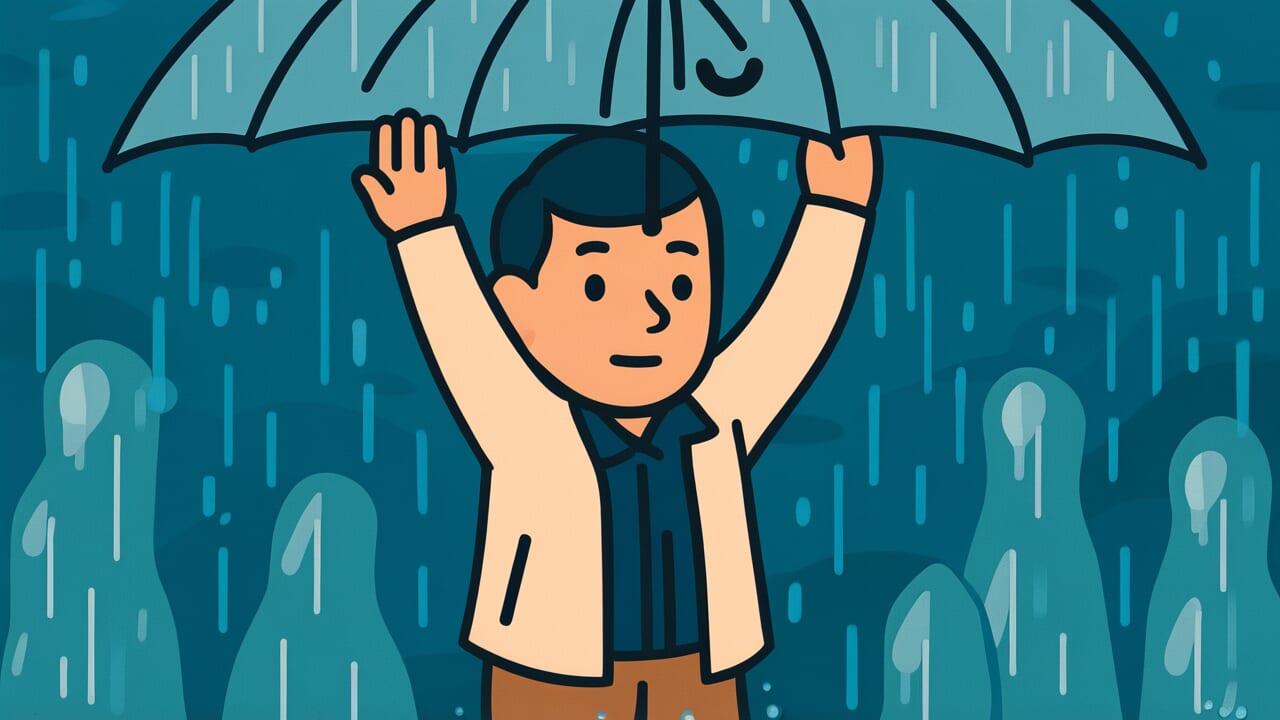How to Read “Once soaked by rain, one fears not the dew”
Ame ni nurete tsuyu osoroshikarazu
Meaning of “Once soaked by rain, one fears not the dew”
This proverb means that people who have experienced major disasters or hardships no longer fear smaller troubles or problems that come later.
For someone who has been completely drenched by heavy rain, getting slightly wet from morning dew is nothing to worry about.
Similarly, people who have overcome great trials in life don’t get shaken by minor troubles.
This proverb is used to praise the mental strength and courage of people who have faced difficulties. It’s also used to encourage those facing small problems.
The more challenging experiences people accumulate, the better they can judge what truly matters. They learn to distinguish between what should really be feared and what shouldn’t.
This shows the human growth process. Even today, this phrase perfectly expresses the mental strength of people who have overcome hardships.
Origin and Etymology
No clear written records explain the origin of this proverb. However, we can make interesting observations from how the phrase is constructed.
The essence of this proverb lies in contrasting two forms of water: rain and dew.
Rain pours down violently and soaks your entire body with its great force. Dew, on the other hand, is just tiny droplets that quietly rest on grass and trees in the morning.
This contrast is the heart of the proverb.
In Japan’s climate, rain has sometimes brought major disasters that threatened people’s lives. Heavy rains caused floods and landslides that could even kill people.
For someone who experienced being beaten by such fierce rain and getting completely soaked, having clothes slightly dampened by morning dew was no longer something to fear.
This expression sharply captures a psychological change in humans. When people experience great trials, their internal “standard of fear” shifts.
What once seemed difficult feels insignificant after experiencing greater hardship. The cleverness of this proverb lies in expressing human adaptability and growth through familiar natural phenomena.
Usage Examples
- He survived the war, so once soaked by rain, one fears not the dew—this level of recession doesn’t faze him at all
- After recovering from a serious illness, once soaked by rain, one fears not the dew—I stopped worrying about small mistakes at work
Universal Wisdom
The universal truth this proverb speaks is that the human heart is strengthened through experience, and our scale of fear changes.
We are not born brave. We gain true strength only by facing difficulties and accumulating experiences of overcoming them.
What’s interesting is that this proverb shows not that we “stop feeling fear” but that we “become able to judge what doesn’t need to be feared.”
The experience of being soaked by heavy rain helps us objectively understand how small dew is. Experience gives us accurate judgment. This is not emotional numbness but the acquisition of wisdom.
In life, we face various difficulties. At each moment, the problem before us feels like the biggest disaster in the world.
However, when we experience greater trials, we realize that what we once feared was actually a small problem. This shift in perception is human growth itself.
Our ancestors keenly understood this psychological mechanism. Difficulties don’t just cause suffering—they also have the power to make people stronger.
And once a heart becomes strong, it never returns to its former state. This is a hopeful truth that humanity has discovered throughout its long history.
That’s why this proverb has been passed down through the ages.
When AI Hears This
When the human brain evaluates loss, it judges based on the current state as a reference point.
For example, losing 1,000 yen hurts, but after already losing 10,000 yen, an additional 1,000 yen doesn’t feel as painful. This is reference point dependence.
Prospect theory explains this phenomenon with a curve called the value function. As losses grow larger, the curve’s slope becomes gentler.
The first loss is intense pain, but additional losses feel relatively duller. In numbers, if the loss from zero to 10,000 yen has a subjective value of minus 100, the loss from 10,000 to 11,000 yen feels like only an additional minus 5.
What’s fascinating about this proverb is that the moment you get completely soaked by rain, your brain’s reference point completely shifts from “dry state” to “wet state.”
With the new reference point, dew-level moisture falls within the margin of error. Adding a little water to an already wet body barely registers as a loss.
People who lose big in gambling continue betting due to the same mechanism. The initial large loss becomes the reference point, and fear of additional losses becomes numb.
This proverb accurately captures a dangerous characteristic of the human judgment system in just a dozen or so characters.
Lessons for Today
What this proverb teaches modern people is the value of facing difficulties rather than running from them.
The problem you’re facing now may indeed be tough. But beyond overcoming it, a stronger version of yourself is waiting.
In modern society, we increasingly overreact to small stresses and anxieties. Minor reactions on social media, small mistakes at work, slight misunderstandings in relationships.
Perhaps we let these disturb our hearts because we have little experience truly facing major difficulties.
What matters is not avoiding difficulties but properly facing them and accumulating experiences of overcoming them.
By doing so, you develop solid judgment standards within yourself. What should be feared and what need not be feared. Being able to make this distinction is true mental strength.
Today’s small challenges will make tomorrow’s you stronger. Don’t fear the experience of getting soaked by rain.
That experience will become both a shield to protect you and a force to move you forward in the life ahead.



Comments